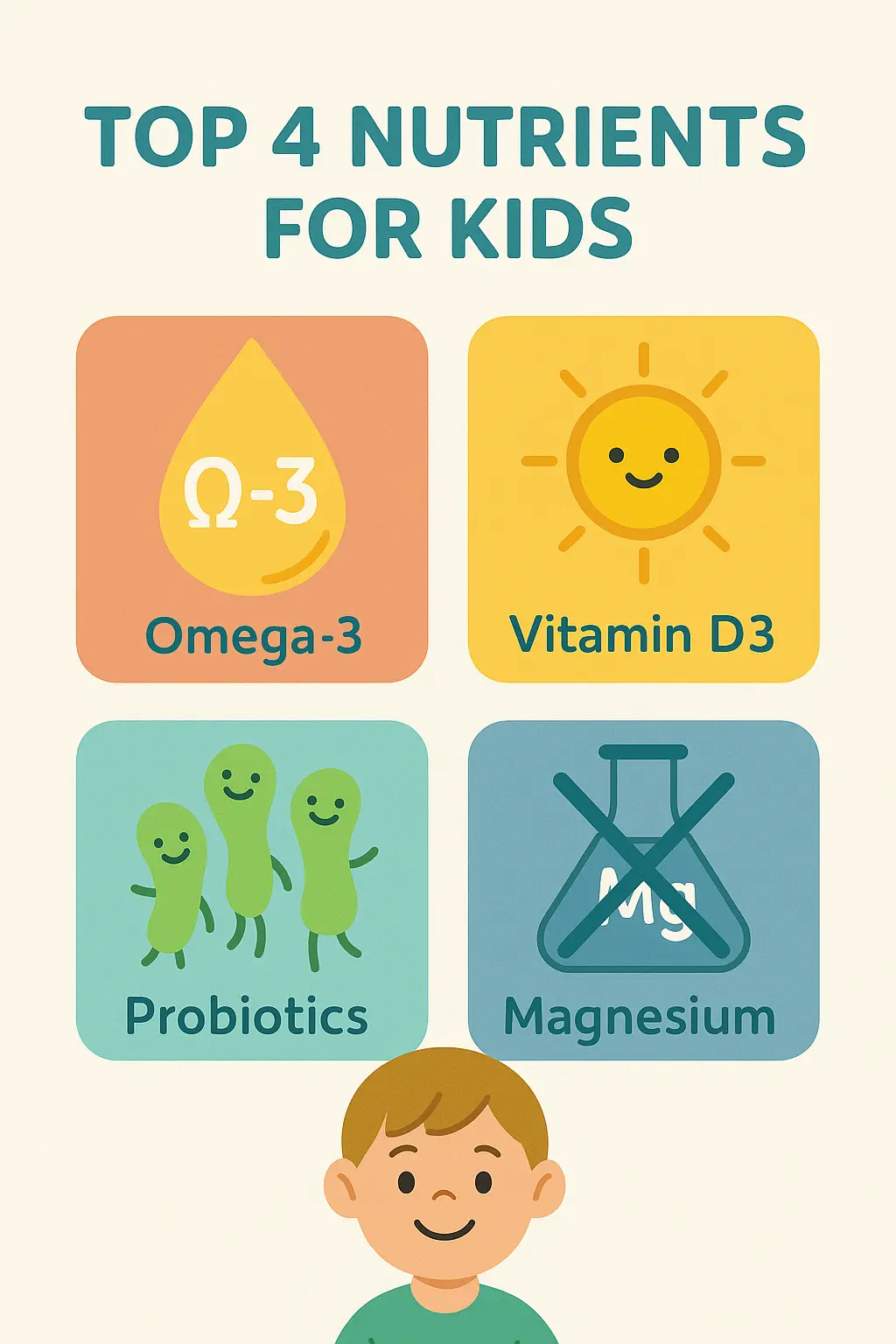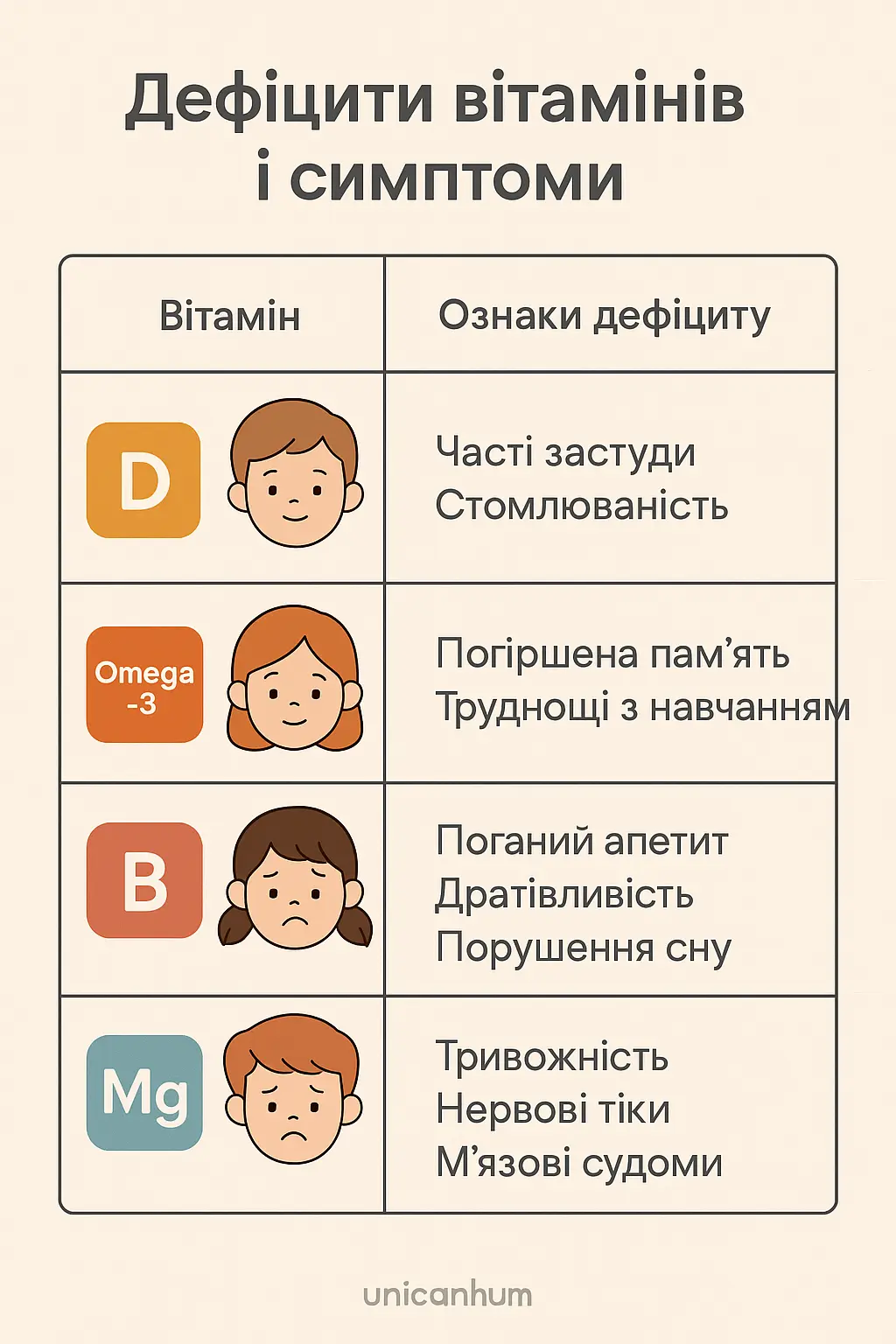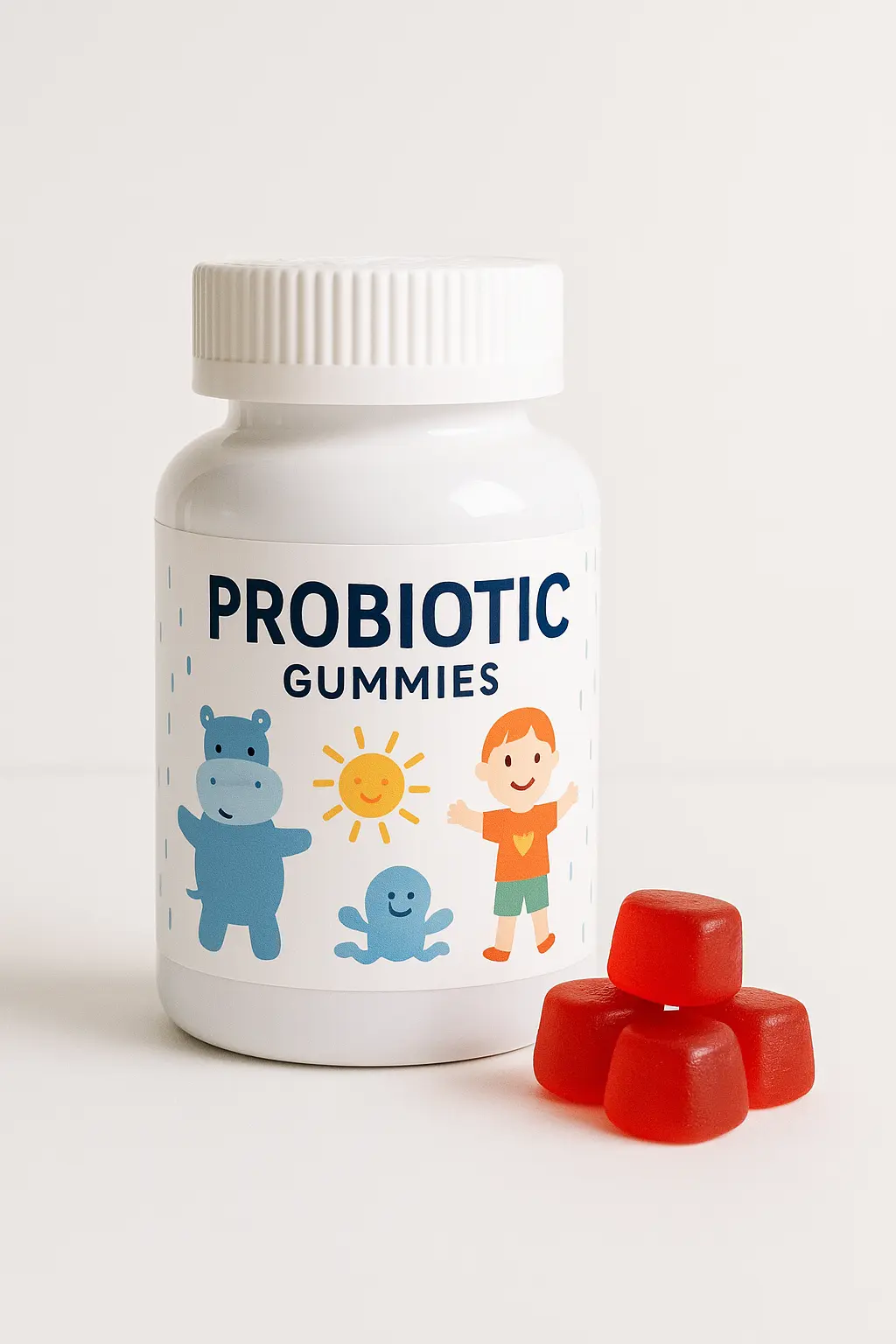

What supplements are really necessary for schoolchildren and how to choose them safely.
Why nutraceuticals have become relevant on the eve of school
Each new school year is stressful for both children and parents.
Schoolchildren’s bodies adapt to a new schedule, increased intellectual load, limited physical activity, and often less than ideal nutrition.
All of this increases the need for key nutrients that support health, concentration, and immunity.

Parents are increasingly paying attention to children’s dietary supplements, but it is important not just to “give something for prevention,” but to select the optimal nutraceuticals taking into account age, nutrition, habits, and typical symptoms.

The most important nutrients for schoolchildren: what, why, and for whom
Omega-3: nutrition for the brain and nervous system
Omega-3 (especially DHA) is a key component of brain cells. Adequate consumption of fatty acids:
-
improves concentration, memory, and learning,
-
reduces symptoms of hyperactivity and emotional instability,
-
promotes better sleep and recovery.
🧒 Who needs it most: children who have trouble concentrating, get tired easily, and don’t eat fish.
💊 Forms: capsules, flavored liquid oil, chewable gummies with DHA.
Vitamin D3: immunity and growth
Vitamin D is important for:
-
bone and tooth formation,
-
immune system support,
-
mood and sleep regulation.
Most children are deficient in autumn and winter, as well as if they do not spend time in the sun.
🧒 Who needs it most: children in cities, with frequent colds or poor appetite.
💊 Forms: sprays (most convenient), drops, gummies.
Probiotics: a shield for the gut and immunity
The microbiota plays a central role in the functioning of the immune system. Probiotics:
-
shorten the duration of acute respiratory viral infections,
-
reduce symptoms of allergies and abdominal discomfort,
-
help after antibiotics.
🧒 Who needs them most: children who are often sick, have bloating, unstable stools, or food allergies.
💊 Forms: powders (in yogurt/juice), chewable tablets, capsules, gummies.
Magnesium: calmness, sleep, and balance
Magnesium participates in over 300 enzymatic reactions and is necessary for:
-
regulating nervous excitability,
-
improving sleep,
-
reducing anxiety and tremors.
🧒 Who needs it most: children who are nervous, wake up at night, have tics, or complain of fatigue.
💊 Forms: citrate, glycinate, gummy, or flavored powders.
Table: common deficiencies in children and what to look for
| Nutrient | Signs of deficiency | When to suspect deficiency |
|---|---|---|
| Vitamin D3 | Frequent colds, weakness, bone pain | Fall, winter, little sun, pale skin |
| Omega-3 | Poor concentration, hyperactivity, fatigue | If you don’t eat fish, there are signs of ADHD |
| Probiotics | Bloating, allergies, unstable stool | After antibiotics, impaired digestion |
| Magnesium | Irritability, poor sleep, convulsions, tics | At the end of the day, the child is exhausted and has trouble sleeping |

What to choose for each age group
👧 6–9 years old:
-
💡 Needs: immunity building, bone tissue development, smooth adaptation to school.
-
✅ Supplements: vitamin D, probiotics, magnesium in gummy or spray form.
-
💊 Advice: stick to the daily dosage — no more than 400 IU of D3.
👦 10–14 years old:
-
💡 Needs: increased brain load, hormonal changes, stress.
-
✅ Supplements: omega-3, probiotics, vitamin D, magnesium (especially in the evening).
-
💊 Tip: choose combination products (e.g., omega + vitamin D).
🧑 15+ years:
-
💡 Needs: peak growth, bone mass formation, unstable routine.
-
✅ Supplements: complex with omega, magnesium, B vitamins, adaptogens.
-
💊 Tip: for boys — additional zinc, for girls — focus on iron (based on analysis).
Which form is better?
| Form | Advantages |
|---|---|
| Gummies | Favorite option for children aged 6–10, high compliance |
| Sprays | Convenient, fast absorption, especially for vitamin D |
| Capsules | Suitable for teenagers aged 12+ who can swallow |
| Powders | Well suited for probiotics and magnesium |

How to choose the right dietary supplement for your child
🔹 Check for certification (GMP, ISO, HACCP)
🔹 Choose products without sugar or with natural sweeteners
🔹 Avoid dyes and synthetic flavorings
🔹 Consult with your pediatrician or family doctor, especially if your child has chronic illnesses

Conclusion
Nutritional supplements are not a mandatory part of every child’s diet, but in conditions of increased stress, unstable nutrition, stress, and sleep deprivation, they are an effective way to support the body during the most difficult period of the year.
August is the perfect time to choose the right supplements, establish a routine, and give children the confidence and energy they need to start the school year.
Scientific research and reviews
-
Calder, P. C. et al.
Omega-3 fatty acids and cognitive function: a review of evidence.
Journal of Nutritional Science. 2021.
https://doi.org/10.1017/jns.2021.11
▶️ The role of DHA/EPA in brain development and attention in children -
Martineau, A. R. et al.
Vitamin D supplementation to prevent acute respiratory infections: systematic review and meta-analysis.
BMJ. 2017.
https://doi.org/10.1136/bmj.i6583
▶️ Vitamin D3 for the prevention of acute respiratory viral infections — relevant for schoolchildren -
Goldenberg, J. Z. et al.
Probiotics for the prevention of pediatric antibiotic-associated diarrhea.
Cochrane Database of Systematic Reviews. 2015.
https://doi.org/10.1002/14651858.CD004827.pub4
▶️ The effectiveness of probiotics in children — especially during illness or after antibiotic treatment -
Gröber, U. et al.
Magnesium in prevention and therapy.
Nutrients. 2015.
https://doi.org/10.3390/nu7030819
▶️ Explanation of magnesium’s effect on anxiety, sleep disorders, and muscle symptoms
Pediatric guidelines and reviews
-
American Academy of Pediatrics (AAP)
Clinical Report: Sports Drinks and Energy Drinks for Children and Adolescents.
Pediatrics. 2011.
▶️ Recommendations for nutraceuticals in childhood -
EFSA (European Food Safety Authority)
Scientific opinions on the tolerable upper intake levels for vitamins and minerals.
EFSA Journal.
https://www.efsa.europa.eu/en/topics/topic/vitamins-and-minerals
▶️ Upper tolerable nutrient intakes for children by age
Practical resources for parents
-
Harvard T.H. Chan School of Public Health
The Nutrition Source – Omega-3 Fatty Acids.
https://www.hsph.harvard.edu/nutritionsource/omega-3-fats/
▶️ Simple and accessible information about the benefits of omega-3 in your diet -
Mayo Clinic
Children’s health: 4 vitamins your child may be missing.
https://www.mayoclinic.org
▶️ A popular source, confirmed by medical expertise



